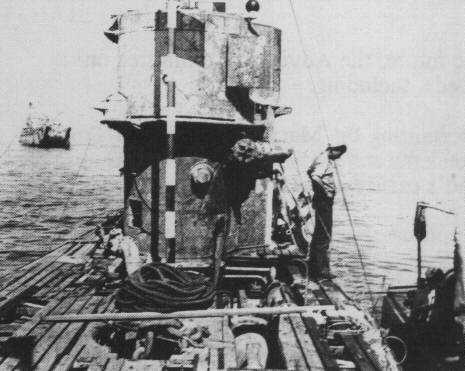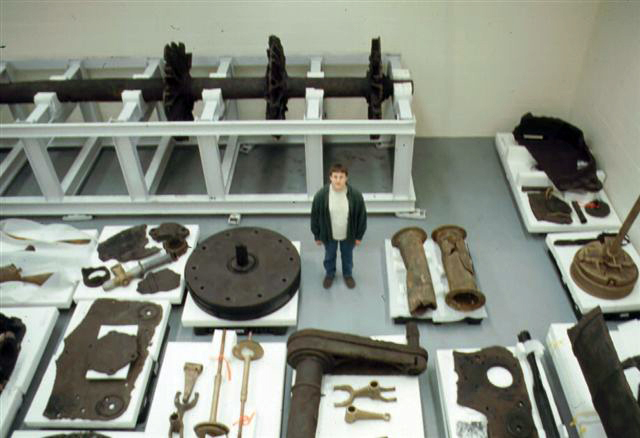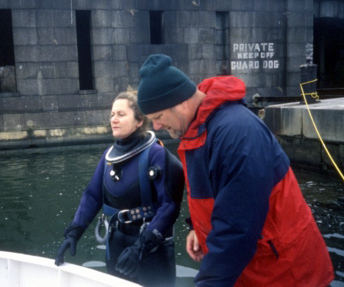Maryland Maritime Archaeology Program
As part of the state Department of Planning and housed in the Maryland Historical
Trust (MHT), the Maryland Maritime Archaeology Program (MMAP) was created in 1988 in response
to the National Abandoned Shipwreck Act that gave states that had management programs in
place, title to significant historic shipwreck remains within their waters. In addition to
shipwrecks, MMAP searches for, inventories and manages the state's other submerged
cultural resources. These include prehistoric sites and historic structures such as buildings,
bridges, and wharf remains. Maryland’s waters cover a range of vessels from native
log canoes to colonial merchantmen and warships, and even relatively modern shipwrecks
of historic importance.
MMAP actively undertakes cooperative endeavors with numerous groups and agencies at local,
state, and federal levels to promote wise management, as well as public education and
outreach. These partnerships include the National Oceanic and Atmospheric Administration,
the U.S. Navy; the National Park Service; the U.S. Army Corps of Engineers; the Maryland
State Highway Administration; the Maryland Department of Natural Resources; maritime,
historical, and archaeological societies; dive clubs; metal detecting groups; and local
and regional schools.
Shipwreck Tagging Archaeological Management Program (STAMP)
The Shipwreck Tagging Archaeological Management Program (STAMP) is a public engagement program
focused on documenting and monitoring shipwreck sites and following the movement of shipwreck
timbers along Maryland's coasts. STAMP is part of a multistate program in which anyone can
participate.
» FURTHER DETAILS
 U-1105 Black Panther before sinking in the Potomac River
in St. Mary’s County, Maryland.
U-1105 Black Panther before sinking in the Potomac River
in St. Mary’s County, Maryland.
U-1105 "Black Panther" Historic Shipwreck Preserve
In addition to finding and studying submerged cultural resources, MMAP actively manages
individual and collections of sites. The U-1105 Black Panther Historic Shipwreck
Preserve is an example of a submerged site that MHT manages through and agreement with
the U.S. Navy.
» LEARN MORE ABOUT U-1105
Volunteers
Most of the work that MMAP carries out would not be possible without the help and support
of volunteers.
Volunteers need not be interested in diving, as archaeological surveys and data management
requires skills in boat handling, recording of artifacts, and a range of computer skills.
» Volunteering with the
Maritime Program
 Artifacts and hull remains from Columbus, after conservation at the
Maryland Archaeological Conservation Lab at the Jefferson Patterson Park and Museum.
Artifacts and hull remains from Columbus, after conservation at the
Maryland Archaeological Conservation Lab at the Jefferson Patterson Park and Museum.
Laws and Regulations
State and federal laws protect submerged historic and archaeological resources located on
Maryland bottomlands. In Maryland, state waters include tidal waters up to the mean high
tide line and three miles from the coastline, and non-tidal waters within the boundaries
of the state that were navigable under the laws of the United States as of April 28,
1788, up to the ordinary high-water mark. MHT regulates and manages all prehistoric
and historic cultural remains in, partially in, or submerged beneath state waters.
Additionally, MMAP is responsible for the administration of the Submerged Archaeological
Historic Property Act and its implementing regulations as well
as applications for research, recovery, or
construction projects; site assessments; and evaluations for National Register
eligibility. MMAP also assists governmental agencies and their program clients to
meet their statutory historic preservation responsibilities through the project
review and compliance process.
» Fact sheet about the regulations governing submerged and semi-submerged
archaeological historic resources.
» Information on permits for
archaeology on submerged cultural resources
Staff and Resources
 Dr. Langley during hardhat diver training.
Dr. Langley during hardhat diver training.
MMAP staff include Dr. Susan Langley and Troy Nowak, who have over 40 years combined experience in conducting
remote-sensing surveys and excavating submerged archaeological resources around the world. Both scientists
are SCUBA certified and have specialized experience in the documentation of shipwreck
structures in the underwater environment.
MMAP is a fully functional scientific unit with numerous research vessels; diving, surveying,
and excavation equipment; and specialized software used to find and study
Maryland’s submerged history.
Research Projects
MMAP works continuously to survey and study the wide variety of submerged cultural
resources that are located on or under Maryland’s bottomlands. Information from
these projects is made available to the public in the form of survey and archaeological
reports, informational brochures, posters, and exhibits.